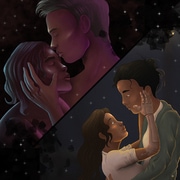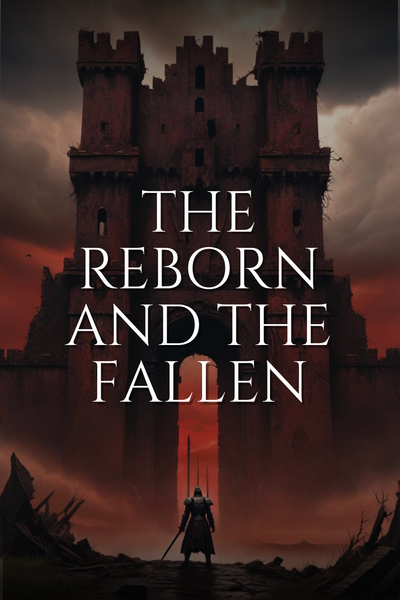The words reverberated through the hall with an almost tangible force, each one a hammer blow against the fragile barriers that Eryth had built around his shattered identity. In that singular moment, the cosmos seemed to pivot on the axis of his soul, and the choice offered before him was as clear as it was terrifying. To serve Valtherion, to once again pledge allegiance to a power that was as dark as the abyss and as cruel as fate itself, was to walk a path where every step would be measured by the pain of atonement and the desperate hope of eventual absolution. Yet to reject that offer, to claim the finality of death as his own, was to surrender to the endless void—a fate more terrifying than even the prospect of eternal servitude in a world of torment and ruin.
Eryth’s heart thundered in his chest, a wild, erratic rhythm that mirrored the chaotic tempest raging within him. His eyes, brimming with both fear and a defiant spark of hope, darted from the imposing figure of Valtherion to the cold, indifferent faces of the assembled onlookers. Every fiber of his being screamed with the desire to cling to life, to seize the chance—no matter how bitter the price—to continue the struggle that had defined him for so long. Yet, beneath that raw urge for self-preservation lay an even more insidious current: the unyielding lure of redemption, a promise whispered in the darkest hours of his past and now offered to him as a final, desperate lifeline.
For long moments, Eryth stood in agonizing silence, his mind a battlefield where two opposing forces clashed with the fury of a thousand storms. On one side lay the cold, unyielding certainty of death—a final, unalterable end to a life steeped in blood and regret. The thought of oblivion, of the silent release that awaited him if he chose to refuse the Demon Lord’s offer, held its own terrible appeal. It was the promise of escape from the relentless torment of existence, a cessation of the endless cycle of violence and sorrow that had so defined his days. Yet, on the other side of that internal conflict was the seductive, almost miraculous prospect of redemption—a chance to redeem himself for the sins that had haunted him, to rise from the ashes of his shattered past and forge a new destiny, however uncertain and treacherous it might be.
Every heartbeat was a struggle between these two irrevocable paths. The memory of every life he had taken, every moment of ruthless efficiency that had once defined him as an assassin, flashed before his eyes like a torrent of images—each one a scar upon his soul. Yet, intermingled with those memories were moments of stark, piercing regret, instances when the weight of his actions had nearly broken him, when the realization of his own monstrous nature had filled him with a sorrow so profound it threatened to drown him in despair. In those fleeting recollections lay the seeds of a possibility that he had long denied—a possibility that perhaps even the most shattered of souls could find a way to heal, to transform the endless cycle of violence into something that might one day be called redemption.
Valtherion’s ultimatum hung in the air like a decree from the gods—a command that transcended mortal judgment and entered the realm of cosmic consequence. His words, delivered with the precision of a masterful orator and the cold finality of a death sentence, echoed within Eryth’s mind, stirring a maelstrom of conflicting emotions. The Demon Lord’s eyes, though cold and inscrutable, held within them the glimmer of a tragic compassion—a silent recognition of the torment that lay at the heart of every damned soul. It was as though Valtherion himself had once been burdened by the chains of regret, and now, in offering this grim choice, he sought not only to salvage a tool of war but to extend, in his own way, a final, bitter chance for absolution.
For Eryth, the choice was no mere decision between life and death—it was a challenge to the very nature of his existence. To serve Valtherion again would be to willingly surrender his autonomy, to bind his fate to a power that was as merciless as it was mysterious. It would mean plunging once more into the heart of darkness, to face not only the physical horrors of battle but the internal demons that had tormented him since the first day he had taken a life. And yet, for all its cruelty, that choice also held the tantalizing promise of redemption—a chance to, however fleetingly, reclaim the honor and humanity that had been so brutally stripped away by a life spent in the shadows of death.
The hall fell into a deep, almost sacred silence as Eryth’s eyes met those of Valtherion. In that look, laden with centuries of unspoken pain and bitter longing, Eryth saw reflected not only the torment of his own soul but the ghost of a possibility—a chance to rise above the legacy of ruin that had defined him. It was a moment of profound vulnerability, as if the very fabric of destiny had been rent open to reveal the raw, bleeding heart of fate itself. And in that moment, Eryth’s inner conflict reached its crescendo—a tumultuous debate waged in the silent corridors of his mind, where the clashing forces of self-preservation and the yearning for redemption battled for dominion.
He recalled the days of his former life—when each step taken in the shadows of death had been a testament to his ruthless efficiency, when every enemy felled had been another stroke in the dark canvas of his destiny. Those memories, once sources of pride and cold satisfaction, now shuddered beneath the weight of regret. Each life taken was a scar upon his soul, a reminder of the abyss he had nearly fallen into, and of the part of him that still, inexplicably, yearned for something beyond the endless cycle of violence. The thought of death, so final and so cold, beckoned with a certain seductive clarity—a promise of oblivion and the cessation of suffering. Yet, the voice of that long-buried hope, the echo of redemption that had been planted in the darkest recesses of his being, stirred once more, offering the possibility of transformation even in the face of damnation.
As the seconds stretched into an eternity, Eryth’s thoughts swirled in a maelstrom of anguish and defiance. He was no stranger to the cruelty of fate, to the idea that every life was measured in moments of bitter choice. And yet, never before had he been presented with an ultimatum so potent, so imbued with the promise of both ruin and renewal. In that charged silence, he felt the weight of every past transgression press upon him, each sin a chain that bound him to a legacy of despair. And yet, amid the crushing sorrow, a spark of resolve flared within him—a fierce, defiant flame that whispered of the possibility that even a soul as tormented as his could be remade.
With a voice that trembled with both defiance and sorrow, Eryth finally spoke, each word a battle cry against the relentless tide of fate. “You offer me a choice,” he said, his tone heavy with the weight of countless regrets and unspoken hopes, “a choice between the cold embrace of death and a life of endless servitude—a life in which I must once again become the instrument of destruction, sacrificing any semblance of redemption I might have hoped to claim. And yet, even now, as I stand upon the brink of oblivion, I cannot help but feel that within this wretched existence, there might yet be a path—a path that leads not only to survival, but to something greater than the sum of my sins.”
Valtherion’s gaze, unyielding and inscrutable, remained fixed upon him. For a moment, the Demon Lord’s expression softened imperceptibly, as if the harsh lines of his visage were momentarily touched by the flame of empathy. “Your words, though weak, betray a spark of understanding,” he intoned, his voice resonating with the gravity of a fallen deity. “Know this: the path I offer is not one of blind obedience, but of penance—a chance to atone for the darkness that has claimed you, to forge from the ashes of your past a future that, while cursed, may yet shine with the light of redemption. Serve me, and you shall have the opportunity to wage war against the true evils that infest this world, to reclaim your honor through acts of courage and sacrifice. Refuse, and you shall embrace death—a final, unyielding end to the torment of your existence.”
The words, so cold and so absolute, echoed in the silence of the hall like the tolling of a funeral bell. Eryth’s heart ached with the enormity of the decision that lay before him. To serve the Demon Lord once more was to surrender not only his freedom but a part of his very soul—the part that still remembered the taste of redemption, however fleeting it might have been. Yet to choose death was to extinguish that fragile spark forever, to allow the endless darkness of oblivion to swallow him whole. In that moment, the true horror was not the specter of death, but the prospect of a life resigned to endless servitude under a master whose heart was as cold as the void.
The gathered crowd, their eyes now fixed on the fated figure before them, seemed to sense the gravity of the moment. A hush fell over the assembly, broken only by the ragged sound of the wind and the distant murmur of disbelieving whispers. It was as if the very universe had paused to witness this singular juncture—a crossroads where destiny itself trembled in anticipation of the choice that would be made. The silence was profound, a palpable tension that stretched every second into an eternity of agony.
Eryth’s mind churned with memories of the past—moments of ruthless triumph and bitter regret, fleeting instants when the desire for survival had warred with the yearning for absolution. He recalled the countless faces of those he had wronged, the lives extinguished by his hand, and the unrelenting specter of guilt that had haunted him through every battle. In those memories lay the foundation of his inner conflict—a ceaseless struggle between the part of him that had reveled in the art of killing and the fragment of his soul that longed for something purer, something that might lift him from the depths of his despair.
And so, with the weight of history and the cry of his own tortured heart as his only witness, Eryth raised his eyes to meet the gaze of the Demon Lord. In that exchange, there passed between them a torrent of unspoken understanding—a recognition of the tragic beauty inherent in the struggle for redemption, even amid the ruins of a life defined by sin and sorrow. “I accept your ultimatum,” he whispered, his voice trembling with both resolve and despair, “not as a surrender to the darkness that has claimed me, but as a challenge to the fate that has bound me for so long. If I must serve you once more, then let it be so that I may, through my own acts, reclaim a measure of honor from the ashes of my past. And if I falter, then let death come as the final, inevitable reckoning.”











Comments (0)
See all